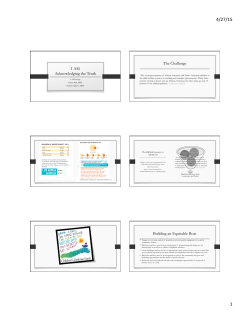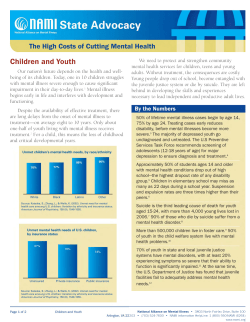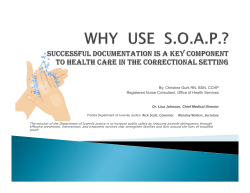
MSC-TTA Application Packet
Request for Applications OJJDP Center for Coordinated Assistance to States Multi-System Collaboration Training and Technical Assistance Program: Building an Infrastructure for Reform Request for Application Contents Section 1. Background and Overview Section 2. Who Should Apply for Training and Technical Assistance Section 3. About the Center for Coordinated Assistance to States Section 4. About the Multi-System Collaboration Training and Technical Assistance Program Section 5. Multi-System Collaboration Training and Technical Assistance Program Expectations Section 6. Application Section 7: Jurisdiction Selection Process Section 8. Application Checklist and Key Dates Section 1. Background and Overview One of the challenges of serving at-risk youth is determining how to effectively deal with the multiple systems in which they are often engaged, e.g., child welfare, education, law enforcement, juvenile justice, and behavioral health. Typically youth involved in these systems have a history of maltreatment and trauma; experience significant educational challenges; are more likely to face disparate treatment on the basis of race, gender, and sexual identity; have high levels of exposure to community and family violence; and suffer from untreated mental health needs and substance abuse issues. Youth involved with multiple systems are a high-need population that requires systems and organizations to work together in a collaborative manner to realize improved outcomes. However, changing entrenched practices, policies, and behaviors presents a myriad of challenges. Human service, justice, and other agencies often lack understanding of each other’s functions and organizational relationships that support integration and collaboration. In support of this work, the Center for Coordinated Assistance to States (CCAS) is offering communities an opportunity to apply for the Multi-System Collaboration Training and Technical Assistance (MSC-TTA) program. This TTA, offered at no cost to participants, will assist multidisciplinary teams in developing a stronger infrastructure to improve system processes and outcomes for at-risk youth and youth involved in multiple systems. States, tribes, territories, local governments, and community agencies and organizations participating in this program will benefit from having: • • • • Knowledge about the infrastructure required to engage in multi-system reform; A better understanding of their multi-system operations; Support and clear direction to produce a multi-system strategic work plan designed to mitigate the identified issues; and A connection to resources and content experts to assist in mobilizing their efforts. Section 2. Who Should Apply for Training and Technical Assistance States, tribes, territories, local governments, and community agencies and organizations that wish to improve outcomes for youth and families, seek to enhance multi-system processes, and are committed to and/or have a history of cross-system collaboration are encouraged to apply. TTA will be provided in the following areas: • • • • Empowering and Strengthening Relationships with Youth and Families Leading Systems Change Developing Information Sharing Agreements Conducting Cross-Systems Assessment and Planning Developing Partnerships with Behavioral Health (Mental Health and Substance Abuse), Education, Law Enforcement and Other Partners to Help Divert Youth from System Involvement Improving Communication between Youth Serving Agencies Incorporating Research and Best Practices into Multi-System Collaboration • • • Completion of the application should be a collaborative process between leaders and/or designees from the family court, and child welfare and juvenile justice agencies. While demonstrated commitment from behavioral health, education, law enforcement, and other partners is also strongly encouraged during the application process and will be expected as part of the MSC-TTA efforts, the application must reflect the commitment from the family court and juvenile justice and child welfare leaders to lead this effort. The MSC-TTA necessitates a commitment of leadership to support system change that will bring multi-system collaboration to fruition. Having leadership from the family court, and child welfare and juvenile justice agencies (and other partners, as appropriate) working jointly to develop an application, identify target areas for improvement and clarify roles and responsibilities will greatly increase the chances of success in this system change process, and lead to more effective outcomes for multi-system youth. Section 3. About the Center for Coordinated Assistance to States Through funding from the U.S. Department of Justice, Office of Justice Programs, Office of Juvenile Justice and Delinquency Prevention, the American Institutes for Research (AIR), Georgetown University McCourt School of Public Policy’s Center for Juvenile Justice Reform (CJJR), and the Council of Juvenile Correctional Administrators (CJCA) have partnered to form the Center for Coordinated Assistance to States (CCAS). CCAS will coordinate the delivery of TTA to states, communities, territories, and tribal units looking to improve outcomes for at-risk youth and youth involved in the juvenile justice and child welfare systems. TTA provided through CCAS focuses on: • • • • • Delinquency Prevention, Intervention, and System Improvement Maximizing State Advisory Group Impact Evidence-Based Approaches in Detention and Commitment Information Sharing, Dually-Involved Youth, and Systems Improvement and Emergency Preparedness CCAS provides TTA using a variety of mechanisms, such as coaching, on-site training, toolkits, issue briefs, webinars, mentoring, establishing communities of practices, and brokering resources. For more information on CCAS and its partnering organizations, please visit the following websites: • • • • CCAS: http://www.ojjdpccas.org AIR: http://www.air.org CJJR: http://cjjr.georgetown.edu CJCA: http://cjca.net. Section 4. About the Multi-System Collaboration Training and Technical Assistance Program The administration of the Multi-System Collaboration Training and Technical Assistance program will be led primarily by CJJR in conjunction with its CCAS partners. The jurisdictions awarded the MSC-TTA will comprise a cohort of up to six sites that will participate in distance learning TTA that is informative, instructional, and interactive. This cohort of sites will engage in a six-month developmental process that will assist them in better understanding their jurisdictional issues related to serving multi-system youth. The MSC-TTA framework will focus on three primary areas of inquiry: 1. Enhancing prevention efforts through a multi-system lens; 2. Developing multi-system responses to youth at-risk for or having crossed over between multiple systems; and 3. Improving multi-system responses to the growing needs of older youth in the emerging years of adulthood This developmental process will require the selected sites to engage in a series of activities that will focus on identifying existing barriers to partnership development and information sharing, understanding how youth are served in various contexts, acknowledging how agency culture impacts change, challenging the role of leadership and empowering others in the change process, and identifying ways to truly partner with and empower youth and families. Section 5. Multi-System Collaboration Training and Technical Assistance Program Expectations Once sites are selected for the program, they will be expected to participate in a distance learning TTA process that includes completion of various assignments through a routine schedule of: • • • Collaborative topical webinars to explore and discuss multi-system issues; Facilitated conference calls and/or video conferences that provide an opportunity for sites to discuss their successes, challenges, and barriers; and Individualized TTA to address site-specific challenges. Section 6. Application Please adhere to the following guidelines while developing your application materials. • • • • Create a separate section to respond in order to each of the application questions Be sure to identify and label your response to each item Do not submit an application in excess of six printed pages including a cover page noting the jurisdiction name and application point of contact Include the page numbers in your application document • It is recommended that the electronic document be in PDF form, but Microsoft Word documents are also accepted When responding to the following application questions, ensure that your responses reflect a multisystem perspective. 1. Briefly describe the agencies and/or organizations applying for the MSC-TTA (e.g., state, tribe, territory, local government, and community agencies and organizations). 2. Briefly describe the specific site that will be the target of the multi-system work (e.g., state, tribe, county, city, community). Please include information such as the location, population size, and other demographic information that is important to note about the site. 3. Briefly describe, as applicable, the site’s family court, and child welfare and juvenile justice agencies, including type of organization, size, client population, county/state/tribal administered. For example, the juvenile justice system may be state-administered and the child welfare system may be county-administered. 4. Briefly describe the site’s education, behavioral health, and law enforcement agencies, including their structure and the population they serve. 5. Indicate why the site is interested in participating in this program by describing the multisystem issue related to juvenile justice on which it wishes to receive TTA. Explain why the site considers this issue to be important, what it hopes to achieve, and note any special challenges faced by the partner agencies and organizations in addressing the identified issue. 6. Indicate which of the following stakeholder groups in the site will participate in this collaboration: Behavioral Health (Mental Health and Substance Abuse) Child Welfare Community Providers and Advocates Court Appointed Special Advocates (CASAs) Education Family Court Guardians Ad Litem Juvenile Justice Law Enforcement Attorneys (Dependency and Delinquency) Other (Please describe) 7. Describe any child-, youth- and family-focused multi-system collaboration in which the site has engaged and the outcomes achieved as a result. 8. Describe the site’s ability to gather and analyze data from multiple agencies, including the use of any existing multi-system databases. 9. Describe the site’s strengths with respect to collaboration and identify particular areas on which the site would like to improve. 10. Please provide any additional information regarding the site you wish to share with the selection committee. Additional Information to Be Submitted with the Application Provide the following information: • • • Names, titles, organizations (using full names, rather than acronyms), telephone numbers, and email addresses of the primary authors of the application; Names and email addresses for the lead family court judge, and child welfare and juvenile justice agency directors; and Name, title, email address, and phone number for the primary point of contact during the application process. Section 7. Jurisdiction Selection Process 1. Informational Call CJJR will host an informational call about the MSC-TTA for those sites interested in applying on February 17, 2015 at 3:30 pm EST. The call-in number is 1-866-910-4857 passcode: 863624#. Applicants are encouraged but not required to participate on the call. 2. Application Submission Interested jurisdictions must submit an application no later than March 16, 2015 to jjreform@georgetown.edu. In the subject line of your RFA submission, please note MSCTTA application. A panel consisting of CCAS organizations and TTA consultants will review the applications. The criteria for selecting jurisdictions will include: • A demonstrated commitment by the site to addressing issues through multi-system collaboration, including any past collaborative efforts; • Evidence of the commitment of leadership from the site’s family court, and child welfare and juvenile justice agencies (the strongest applications will include evidence of participation by all stakeholder groups listed in Question 6- Section 6) and other partners relevant to addressing the issue the site chooses to address; and • Clarity and completeness of responses to the application questions. 3. Notice of Acceptance On March 27, 2015 up to six sites will be notified of their acceptance to the MSC-TTA program. Those notices will be sent via email to the identified parties on the application by 5 pm EST. All selected sites must be available to participate in the first webinar scheduled for April 7, 2015 at 2 pm EST. Section 8. Application Checklist and Key Dates Attend informational call on February 17, 2015 at 3:30 pm EST o Call-in number: 1-866-910-4857; passcode: 863624# o Applicants are encouraged but not required to participate. Submit completed application by March 16, 2015 to jjreform@georgetown.edu. Receive notice confirming receipt of application by March 17, 2015 Receive notice of selection on March 27, 2015 by 5 pm EST Attend initial webinar for selected jurisdictions on April 7, 2015 at 2 pm EST All inquiries regarding the MSC-TTA should be directed to Macon Stewart via email at macon.stewart@georgetown.edu or via phone at 336-323-7332. To learn more about the programs and events the Center for Juvenile Justice Reform will be offering as part of the Center for Coordinated Assistance to States, please visit our website at http://cjjr.georgetown.edu/CCAS.html.
© Copyright 2025









